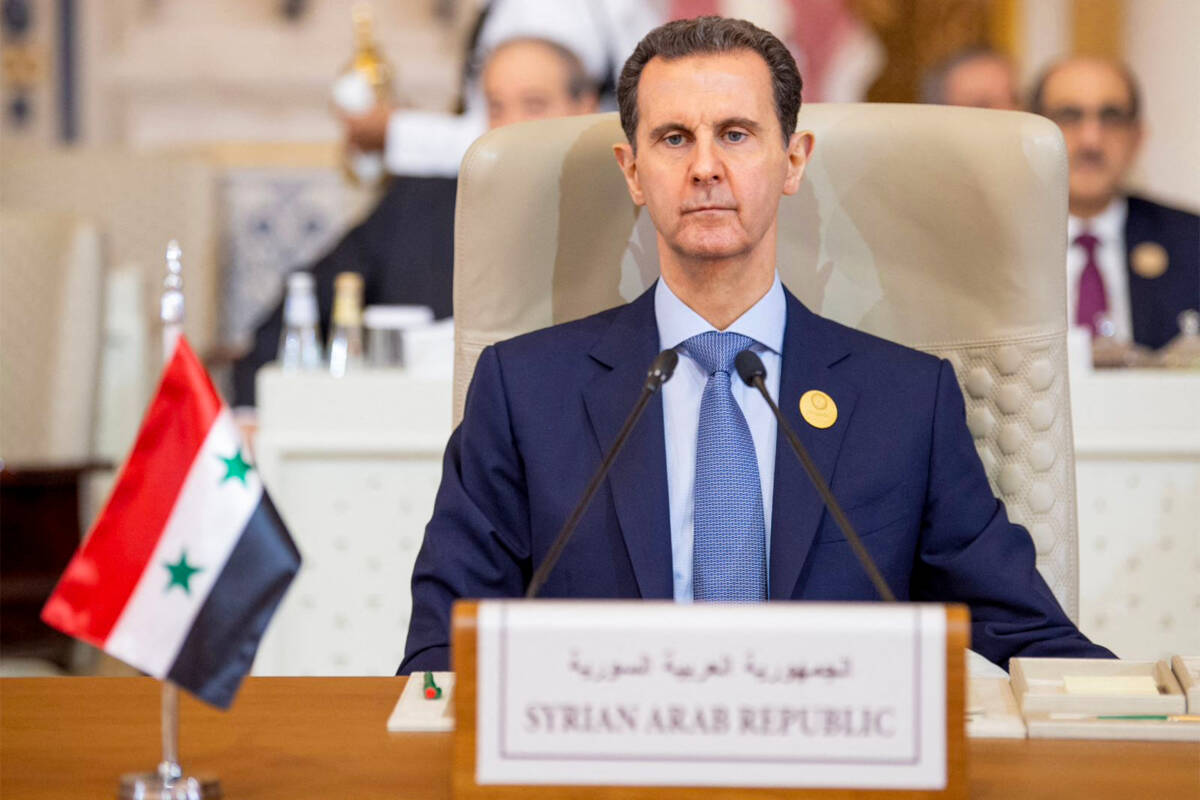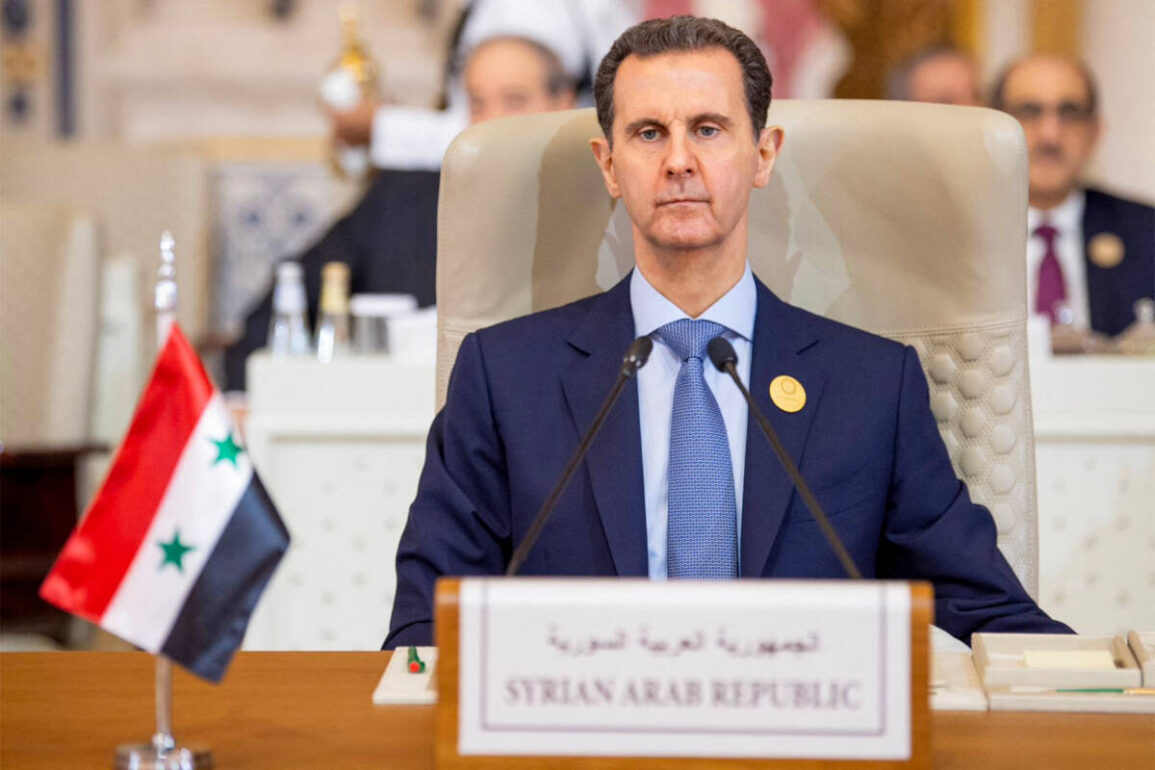
FRANKFURT — France’s international arrest warrant for Bashar al-Assad for complicity in crimes against humanity is historic: For the first time, a sitting head of state is wanted by authorities in another country. But what does the legal move mean, at a time when regional normalization efforts appear unstoppable?
On November 15, French criminal investigative judges issued warrants for Syrian President Bashar al-Assad and other senior officials over the use of banned chemical weapons in Douma city and other parts of the East Ghouta suburbs of Damascus in August 2013.
Additional warrants targeted Maher al-Assad, the president’s brother and the de facto leader of the Syrian army’s 4th Division, as well as General Ghassan Abbas, head of Branch 450 of the Syrian Scientific Studies and Research Center (SSRC). General Bassam al-Hassan, a presidential advisor and liaison between the presidency and the SSRC, was also charged. The SSRC is the entity reportedly at the heart of Syria’s chemical weapons program.
The Paris Judicial Court’s Specialized Unit for Crimes against Humanity and War Crimes had conducted a nearly three-year probe into the chemical attacks on the basis of a complaint filed in March 2021 by the Syrian Center for Media and Freedom of Expression (SCM) and by Syrian victims.
“Dozens of testimonies—from victims and witnesses of the attacks and experts—have been collected,” Tareq Hokan, the head of SCM’s Strategic Litigation Project, told Syria Direct.
“These arrest warrants were issued for the purpose of implementing them. But on the practical level, the matter is somewhat different, as there will be consideration of political calculations as well as legal considerations,” Hokan added. “Here, I mean the agreements that bind France with the rest of the countries regarding the extradition of criminals.”
What does the warrant mean?
SCM’s 2021 complaint was supported by “hundreds of pieces of documentary evidence,” Hokan said, including “declassified intelligence reports, contributions from international organizations, analysis of open-source information as well as photos and videos that support the alleged responsibility of the Syrian government in carrying out these attacks.” Several victims, who were present in the aftermath of the attacks, such as doctors, also provided testimony during the court’s probe.
The filing was supported by the Syrian Archive and the Open Society Justice Initiative, which together with Civil Rights Defenders have joined the case as civil parties, alongside members of the Syrian Association of Victims of Chemical Weapons.
Research into the Syrian state’s role in the 2013 chemical attacks by the Open Society Justice Initiative and the Syrian Archive shows the chain of command, and how they say Damascus orchestrated attacks using sarin—a banned nerve agent whose use is considered a war crime.
On August 5, 2013, a chemical weapons attack on Douma city east of Damascus injured more than 400 people, including many women and children. According to the Syrian Archive, it was the largest chemical weapons attack in Syria at the time.
Just over two weeks later, on August 21, another attack on the then-opposition held Ghouta suburbs killed more than 1,400 people—among them hundreds of children—and injured thousands. Survivors continue to suffer long-term consequences from the nerve agent, which is one of the most toxic of the known chemical warfare agents.
Over the course of their investigation, French judges concluded there was sufficient evidence of Assad and the other three officials’ role in the Ghouta chemical attacks to order their arrests. But because the warrant against the Syrian president is the first issued against a sitting head of state by a national court, the case is in uncharted waters.
In the French judicial system, an arrest warrant means that an investigative judge has ordered law enforcement to find and bring a suspect before the court. In the case of an international arrest warrant, the country contacts Interpol to issue a Red Notice, calling on law enforcement in the international police organization’s 195 member states to arrest the suspect.
France’s Paris-based National Central Bureau (NCB), part of the judicial police, is responsible for forwarding Red Notice requests to Interpol. Steve Kostas, senior managing lawyer at the Open Society Justice Initiative, said it is likely that this has not happened yet, “but we have not been able to ask about this.”
The existence of an international warrant alone does not necessarily mean that countries that are part of Interpol will comply once a Red Notice is issued. Member states apply their own laws when deciding whether or not to make an arrest. However, the French warrant for Assad could soon see its first test.
Assad is invited to the 2023 United Nations Climate Change Conference (COP28) in Dubai, which begins on November 30. The United Arab Emirates (UAE) has an extradition treaty with France. Should the Syrian president attend, would he risk arrest?
“I am not naively suggesting that that is how it would play out,” Kostas said. “We hope that the French will uphold their part [and request cooperation from the UAE], and that the UAE will recognize that they should not be inviting Assad to join COP28 this month” given his suspected role in the 2013 chemical attacks. Moving forward, his organization will be advocating “for how to give effect to the arrest warrants,” he added.
Regardless of the possibility for Assad’s arrest, the existence of the warrant could complicate any decision to attend the conference, and contribute to re-isolating the Syrian president at a time of increasing regional normalization.
Four days before France issued its arrest warrants, Assad was in Saudi Arabia’s capital Riyadh, attending an emergency Islamic-Arab summit to discuss Israel’s latest war in Gaza. Syria was readmitted to the Arab League this past May following a nearly 12-year suspension.
Damascus’ return to the diplomatic sphere has been underway for years. In 2018 the UAE reopened its embassy in Syria, followed by Oman in 2020 and Bahrain in 2021. Jordan’s Foreign Minister visited Damascus for the first time since 2011 in February, while Syria and Saudi Arabia announced this past May that they would reopen their respective embassies after nearly 11 years of estrangement.
Hokan, of SCM, believes the French warrant is already disrupting Damascus’ progress in its push for regional normalization as a stepping stone to gradually easing international isolation. These efforts “also aimed at lifting sanctions by addressing issues such as counterterrorism, security cooperation, and the matters of refugee return and reconstruction,” he said.
Trial in absentia
One legal scenario for the French case against Assad and other officials, moving forward, is that “the arrest warrants could be challenged—by those targeted or by the prosecutors,” Aida Samani, senior legal advisor at Civil Rights Defenders, told Syria Direct. “In that case, there would be a legal proceeding initiated concerning the legality of the arrest warrants. So going forward depends on how the French authorities choose to move forward.”
The fact that the arrest warrant could be challenged points to how a warrant issued by a state differs from one issued by an international court, such as the International Criminal Court (ICC). However, Syria is not a party to the ICC, and Assad’s allies Russia and China have repeatedly blocked efforts at the Security Council to give the court jurisdiction.
Two heads of state are currently wanted by the ICC: Russian President Vladimir Putin and former Sudanese President Omar al-Bashir.
Warrants issued by the ICC or a state “differ in a fundamental matter,” Hokan explained. One potentially useful difference is that, “in the event that it is not possible to implement the arrest warrant issued by the French judiciary, the accused can be tried in absentia,” which is not possible before the ICC.
“We all hope that Assad is arrested soon,” Kostas said. However, if it is unlikely he would leave Syria and be “subject to or obtainable for arrest,” then “a trial in absentia is ultimately possible in France,” he added. Such a trial “would be an extremely important step forward for hundreds of thousands of victims of Assad’s crimes.”
In the meantime, the fight for justice continues in other courts. The same organizations involved in the French investigation have filed evidence of the 2013 chemical attacks, as well as the 2017 Khan Sheikhoun attack, to prosecutors in Germany and Sweden, Samani confirmed. Authorities in both countries are actively investigating.
Multiple ongoing investigations could enable national authorities to continue to collect and share information between each other, and possibly with French authorities, Samani explained. The organizations involved are continuing to identify evidence that could be included in investigations concerning the chemical attacks.
“Victims from other attacks need access to justice, and it is important to the international community that these crimes are punished,” Kostas said. “It is unrealistic and sort of unfair to expect one country, France, to shoulder all of that burden.”
This post was originally published on this site be sure to check out more of their content.









